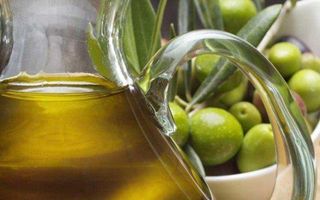(Finance) – The drought causes Italian olive oil production to collapse with an expected decline of about 32%. Due to the lack of rain and the record heat that hit the major producing regions such as the South Puglia and Sicily. TO raise the alarm, I’m Coldiretti, Unaprol and Ismeawhich they have the 2024 estimates were presented to the G7 Agriculture Group in Syracuse For the Olive Grove Italyon the occasion of the start of the harvest which took place in Sicily 15/20 days early, mainly due to the record heat which accelerated maturation, effectively bringing the first new oil onto Italian tables at the end of September. Present at the meeting were David Granieri, national vice-president of Coldiretti and president of Unaprol, Maria Chiara Zaganelli, general director of Ismea, and Nicola Di Noia, director of Unaprol.
Olive oil production is expected to be around this year 224 million kilos, a quantity that does Italy drops to fifth place in the ranking of the main producing countries, according to Coldiretti, Unaprol and Ismea. The Apulian data, where the harvest is estimated to be practically halved compared to last year, weighs heavily on the campaign. In the region, which alone represents about a third of the national olive groves, flowering and fruit set were quite limited this year, with the plants experiencing water stress due to the little summer rain and high temperatures. Similar situation in Calabria and Sicily where losses are estimated which at the moment, however, seem more contained than those in Puglia.
In Calabria, another strong producing region, la prolonged absence of precipitation it accentuated the water stress of the plants, to which was added an early fall of the olives, especially in younger or less vigorous orchards. In Sicily flowering and fruit set were good but part of the production was lost due to the fruit drop phenomenon in June and part of July. The drought in August further reduced expectations, even if the first data on oil yields seem rather good according to Coldiretti, Unaprol and Ismea.
The collapse of production in the South is contrasted by the record increase recorded in the regions of North, with +75%, and the Center (+70%) compared to a very deficit in 2023. Good news also arrives on the quality front which promises to be excellent, thanks to the commitment of the approximately 400 thousand national agricultural companies in guaranteeing a product of very high standards, giving Italy leadership in Europe for the largest number of extra virgin olive oils with denomination in Europe (43 PDO and 4 PGI) with a heritage of 250 million plants and 533 varieties of olives, the largest treasure of biodiversity in the world, based on Coldiretti analysis.
“It is no coincidence that last year the 100% Made in Italy Italian extra virgin olive oil was the only one to grow in consumption, demonstrating how Italian consumers have rewarded quality of a product with immediately perceptible organoleptic characteristics – he underlines David Granieri, national vice-president of Coldiretti and president of Unaprolthe association of olive producers -. A result that highlights how our Evo should no longer be considered a commodity linked to the logic of price, but a real food, which countless studies indicate as a precious elixir of long life, as well as a cornerstone of the Mediterranean Diet. From here the need to keep our guard up against any attempt at speculation which may find fertile ground in the scarcity of the product at a global level, in the inevitable increase in prices and in the reduction of the price differential between Italian extra virgin olive oil and that of the main producing countries”.
Among other things, Unaprol and Coldiretti are carrying out one anti-fraud policy, increasingly growing due to the scarcity of the product, proposing at all institutional, national and international tables, the proposal to restrict the parameters relating to the acidity level of Evo oil, from 0.8% to 0.5%. Important from this perspective is the arrival of the new decree, strongly desired by Coldiretti and Unaprol and currently being published, on method of recording olives purchased from olive traders, with specific functions provided on the Sian, which will ensure greater transparency and traceability. Also necessary strengthen discipline regarding condiments, which should have a detailed indication on the label of the percentage of extra virgin olive oil present in blends that predominantly use refined oils and must be clearly separated on the shelves from extra virgin olive oil, so as not to cause confusion among consumers and allow deceptive maneuvers.
But the commitment of the Italian olive supply chain with Unaprol and Coldiretti also looks at climate changes asking to accelerate the implementation of the invasion plan with pumping and change steps for planned management of water resources, without which even Italian olive growing can no longer guarantee constant, quality production due to the increasingly violent effects of climate change.
